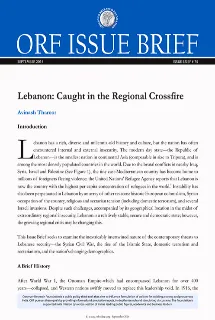Lebanon has a rich, diverse and millennia-old history and culture, but the nation has often Lencountered internal and external insecurity. The modern day state the Republic of Lebanon is the smallest nation in continental Asia (comparable in size to Tripura), and is among the most densely populated countries in the world. Due to the brutal conflicts in nearby Iraq, Syria, Israel and Palestine, the tiny east-Mediterranean country has become home to millions of foreigners fleeing violence: the United Nations’ Refugee Agency reports that Lebanon is now the country with the highest per capita concentration of refugees in the world.
Instability has also been perpetuated in Lebanon by an array of other reasons: historic European colonialism, Syrian occupation of the country, religious and sectarian tension (including domestic terrorism), and several Israeli invasions. Despite such challenges, accompanied by its geographical location in the midst of extraordinary regional insecurity, Lebanon is a relatively stable, secure and democratic state; however, the growing regional crisis may be changing this.
This Issue Brief seeks to examine the inextricably intertwined nature of the contemporary threats to Lebanese security—the Syrian Civil War, the rise of the Islamic State, domestic terrorism and sectarianism, and the nation’s changing demographics.
The views expressed above belong to the author(s). ORF research and analyses now available on Telegram! Click here to access our curated content — blogs, longforms and interviews.

 PDF Download
PDF Download



 PREV
PREV

